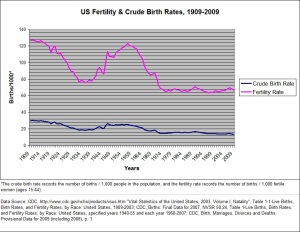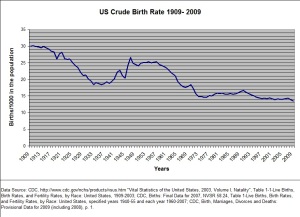New data from the National Center for Health Statistics show that both the US crude birthrate and the fertility rate fell in 2009, hand in hand with the falling economy, continuing the trend begun in 2008. People don’t want to have kids they can’t afford – basically a responsible and predicted decision.
It happens that the crude birth rate—at 13.5*— is the lowest in a century (so basically it’s the lowest ever in the US) – and that’s making headlines and summoning images of a baby-less, unstable future. But that’s not what’s happening. The wire story tells us:
The United States birthrate has fallen to its lowest level in at least a century as many people apparently decided they could not afford more mouths to feed….The situation is a striking turnabout from 2007, when more babies were born in the United States than in any other year in the nation’s history. The recession
began that fall, dragging down stocks, jobs and births.
Connections like these confuse the birth rate, the fertility rate, and the number of births. The birthrate (the number of births per 1000 people in the population) is not the important indicator here – what matters is the fertility rate (the number of births per 1000 fertile women [ages 15 to 44]) – which is also sometimes confusingly called a birth rate. The fertility rate did drop a bit last year, but not to record low levels.
So you’re not crazy. Those babies you saw in the park (or took to the park) this weekend were not figments of your imagination. And hospital delivery rooms are not suddenly empty. As you’ll recall, the fertility rate in 2007 was way up (to 69.5)† – higher than it had been since 1990 (70.9), so having it fall a bit now (down to 66.8) just means that we’re back where we were four years ago before the economic boom (which turned out to be pretty pseudo) led some folks to have more kids than they might otherwise.
In spite of the recession, in spite of the headlines, and in spite of the fact that fewer kids are arriving lately, we are not seeing record low numbers of women having kids. But we are seeing record numbers of older people. As the last boomers move out of their fertility years into that 45 to 64 year-old age band, and as older folks continue to stick around longer and longer, it negatively affects the birth rate because the proportion of no-longer-fertile people is increasing. Even if the fertility rate stays steady, when the proportion of old folks grows, the share of the overall population represented by fertile women necessarily decreases, and so the crude birth rate does too. Like crude oil, the crude birth rate needs some refining to be useful.
As noted, in 2009 the fertility rate did also decline (from the recent high of 69.5 in 2007 to 66.8) but it’s still in the narrow range it’s shimmered in for the past forty years, and apart from the past three years, higher than it’s been since 1993, when it was 67.0. The record bottomed out in 1997, at 63.6.
As you can see in the first graph above, the real story of fertility decline happened most recently in the 60s and 70s, and before that between the world wars. The ups and downs of our era are miniscule in comparison. Contra the needs of the news cycle, nothing drastic or frightening is happening on the fertility front this year. It’s just plain family planning.
This post first appeared on RH Reality Check.
*The rate in 1800 was about 55 births / 1000 population; in 1900 it was about 30, in 1929 it had declined to 21.2; by 1936 at the low point in the depression it was 18.6. After the war it boomed back up into the mid twenties, but headed down after that to 15.9 in 1980, 14.0 in 2000, and the new low of 13.5 in 2009.
†2007 was also the year we had a record high number of babies—outdoing the baby boom high in 1957, raised because the number of people having babies in 2007 was much bigger, though the fertility rate in 2007 was much lower than in 1957 (69.5 compared to 122.7)—along with stories of rising total fertility rates (numbers of babies a person would have over her lifetime at the current rate) over the year prior.




You should always interpret the news! This makes a lot of sense.
US birthrate is at a low! I think that’s fabulous news given the state of our world and the environment. Women are finally starting to ask themselves if being a mother is really what they want. We are realizing that we’ve been fed a line, being told that if we miss out on motherhood we’ll have missed THE MOST important and wonderful experience of a lifetime. Meanwhile, those who become mothers are often overwhelmed, exhausted, and disappointed. Plus, they fail to accomplish other personal goals that may have given them more pleasure in life and done more good for the world. Check out my website, Completewithoutkids.com and my upcoming book, Complete without Kids: An insider’s guide to childfree living by choice or by chance.
Ellen L. Walker, PhD
Elizabeth, there is simply not enough discussion about these types of matters. I am so thrilled to come across this web-site and your wonderful posts. I truly believe there is a shift going on in Moms and for Moms. I wanted to share my blog which is similar to yours in topics but with a different perspective. I wrote “You’ll Need To Pay Me To Make Another Capitalist” http://ultimateoutcasts.com/?p=113 about this very same issue. Best Regards. I look forward to reading more of your material.